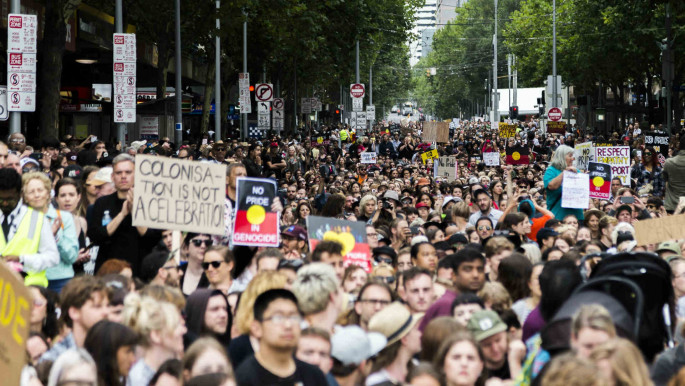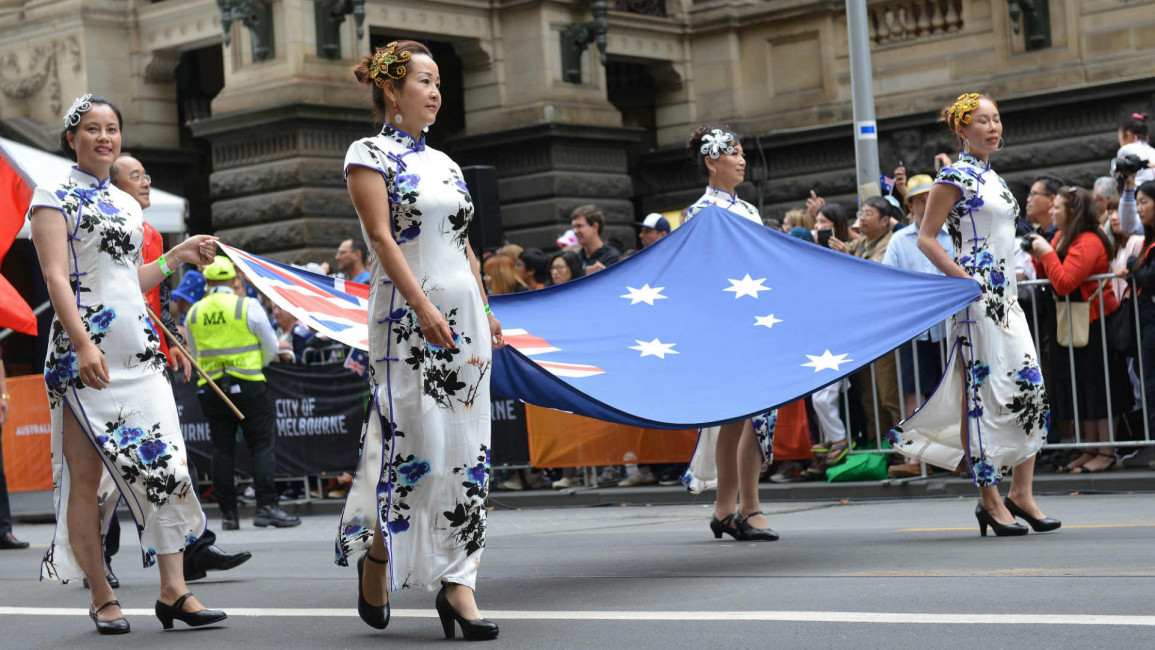
Australia's struggle with diversity is about power and fear
More specifically, having dual citizenship can affect one's eligibility to be a member of Parliament, causing some ministers to leave office - even placing pressure on our deputy PM to exit as well.
It's farcical when you consider the pressure migrants in Australia are placed under by government - indeed by many citizens - and the way Australia has treated refugees, detaining them both in Australia and offshore.
In fact, as I write, the news of the day is the government's recent push to purify Australia's multicultural waters with a crackdown on Australian citizenship. This included the introduction of a longer waiting period for permanent residents, and testing – of language and 'values'. It's not enough to be a law-abiding citizen; you need to follow a particular values code that, I presume, includes but is not limited to mateship.
It seems that the immigration minister's proposal is destined for failure, or at least rigorous challenges, with certain parties blocking it. But while this offers some relief amid relentless discussions around race, Australian 'values' and who has the right to be here, we are far from relaxing into effortless diversity as a multicultural nation, and the pressure on migrants is ever increasing.
 |
We're a country where the Aussie dream is being eroded by a multicultural reality |  |
We're a country where the Aussie dream is being eroded by a multicultural reality – that systemic racism exists, and that while you can have a great life in Australia, and love and appreciate it as your home, it doesn't mean everyone considers you welcome.
| Read more: Anti-immigration Australian senator Pauline Hanson wears full burqa in parliament |
It's not a country of effortless, harmonious diversity; though I believe it does exist in pockets. In many ways, we're a nation offering the appearance of a racial utopia, even though the current dominant narrative is actually one of conformity. The rigid allegiance racist people despise in you is the very same belief system that is deep-rooted in their own ethos.
 |
|
| An 'anti-colonisation' protest on Australia Day in Melbourne [Anadolu] |
The offence doesn't necessarily lie in desiring that people learn English; it's in the assumption that they don't want to and the subsequent regulation that determines they must if they are to become a citizen.
More worrying is the determination of an individual's values system – a flimsy mask for the view that all migrants carry with them outdated and out-of-place ideas that are inherently at odds with those of 'ordinary Australians'.
Implicit in this messaging is the idea that only migrants cause trouble; that the rest of Australia, so welcoming and nurturing, has to put up with ungrateful people wanting a chunk of the Australian pie without effort. Of course, this accusation contradicts another well-worn gripe – that migrants are out to steal Australian jobs.
Learning the language in Australia is not a bad thing to do. But the demand that anyone becoming a citizen speaks English is setting people up to fail. Our Prime Minister has admonished migrants for not learning the language, assuming that many aren't English speakers, and suggesting that migrants have an aversion to being active participants in society.
The so-called assimilation so many people proclaim is necessary for a well-functioning, harmonious society is mired in confusing messages: that all are welcome; that Australia is a multicultural nirvana that celebrates 'difference';- that there is room for everyone – but, you have to blend in, learn the language and declare fealty to your adopted home.
 |
Why else is identity politics overflowing into all aspects of our lives? |  |
For many of us, these messages ring hollow. We might love the idea of multicultural accord in the food court, but we struggle for seamless 'inclusion' everywhere else.
Why else do we need 'diversity' as a structural element in the workplace and wider society? Why else is identity politics overflowing into all aspects of our lives?
It's because for all of its successes, and there are some, western countries – despite their colonial histories – struggle to accept true diversity, the effortless kind where systemic bias is not a factor.
Perhaps one of the most distressing elements to this is how the migrant narrative has been sullied with falsity. To many, migrants now symbolise interlopers who have no interest in adapting to their new country – as though bringing your culture with you is a direct challenge to the one you're entering as a new citizen.
| Read more: Arab women are driving their own change - they deserve respect, not pity |
On the one hand you're a visitor, but you're chastised for refusing to belong and be just like everyone else. Of course, what is being asked of migrants is impossible, and the people making unrealistic demands know it. It's a set-up for failure, and one that is ridiculously myopic given Australia's history of invasion.
It's difficult being witness to this, knowing what my parents, and so many other migrants, have gone through, only to be viewed so unfairly and with so much mistrust.
And of those of us born here, we face a new challenge. We don't necessarily bear evidence of our heritage in the way we speak, but many of us have odd-sounding names that set us apart.
We have a look about us, and are accustomed to being asked 'where are you from?'. I don't really mind the latter question – I have no problem acknowledging my heritage and ancestry.
 |
The answer isn't to pronounce what is considered 'different' to the norm; it is to open up spaces so that varying experiences – genuine diversity – is normalised. |  |
What's harder to stomach is the intention behind it. Australia, like its western counterparts in the US and the UK, is tribal and fiercely protective. Generations of migrants' kids are now 'assimilated' and it bothers people. Racism is, ultimately, about power, and migrants succeeding poses a threat to it.
When I appeared on a television panel show a few months ago to discuss current issues of the day, Australia had just delivered its census. The results indicated that what a 'normal' Australian looked like decades ago has understandably changed.
I made the observation that migrants are considered more threatening now because we are assimilated and successful, and it's amplified the racism we experience. The reaction was fierce and immediate. I didn't bother filtering the hate and anger – I just ignored it. But the reaction was telling - migrants need to stay in their box.
We know that systemic racism has done damage in civil society that will take years to undo - if it ever gets undone at all. The solution would appear to be 'diversity', even if the result, for now, is often little more than clumsy tokenism.
It doesn't have to be though. Migrants and their kids are in many ways functioning 'normally' in society, but the challenge for us now is to navigate the hyper awareness around race and migrant populations without isolating people further.
The answer isn't to pronounce what is considered 'different' to the norm; it is to open up spaces so that varying experiences – genuine diversity – is normalised.
For all of the pronouncements from government, for all of the racism people experience, the way forward is opportunity that doesn't rely on the ticking of diversity boxes.
If for now, the only way to create these opportunities is through schemes that acknowledge the gaps, then so be it. But more effortless diversity is what we need if we're to see the genuine success of multicultural societies.
Follow her on Twitter: @amalmawad
Opinions expressed in this article remain those of the author, and do not necessarily represent those of The New Arab, its editorial board or staff.




